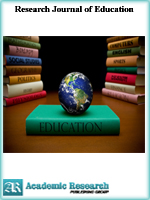Research Journal of Education
Online ISSN: 2413-0540
Print ISSN: 2413-8886
Print ISSN: 2413-8886
Quarterly Published (4 Issues Per Year)

Archives
Volume 3 Number 4 April 2017
Comparing Elementary Mathematics Textbooks? Introduction of Symbols for Algebraic Unknowns in Taiwan, Singapore, and Finland
Authors: Der-Ching Yang ; Tseng-Cheng Chiang
Pages: 36-43
Abstract
This study applied a content analysis method to compare how the algebraic topic of using symbols for unknown quantities is presented in elementary school mathematics textbooks from Taiwan (Nani), Singapore (My Pals Are Here!), and Finland (Laskutaito). Specifically, differences in question types (purely mathematical, verbal, visual, or combined representation), contextual versus noncontextual presentation, and pedagogical content design were compared. The findings showed that (1) fewer visual representations are found in Nani compared with the other textbooks; (2) Taiwan uses more contextual problems than the other countries; and (3) the content design in Taiwan focuses on applying the equivalent axiom to solve for unknown quantities, whereas Singapore and Finland use line segments or divide concepts in geometry graphs. In addition, the Singaporean textbooks teach algebraic simplification, providing this topic earlier than the other countries and enabling students to form connections with junior high school learning. Other implications of this study are discussed, and suggestions for future research are provided.
Chemical Engineering Curriculum System Research and Building in the Training of Engineering Idea and Ability
Authors: Xiu-yan Pang ; Xiu-lan Liu ; Yan-su Wang ; Yan Li ; Rui-nian Lin
Pages: 32-35
Abstract
The importance of education quality can never be over emphasized. The objective of this research is to introduce how to set up scientific and reasonable curriculum system in the training of chemical engineering ideas and abilities of students who majored in chemistry and other related specialties. According to the many years practice, the system is built and optimized, and it includes the following courses in the order of “Elementary Chemical Industry”, “Chemical Engineering Experiment”, “Chemical Industry Charting”, “Industry Chemistry” or “Chemical Technology”, “Chemical Process Simulation Experiment”, “Chemical Process and Plant Design”, “Chemical Practice”. Teaching practices have testified that students cultivated by this curriculum system presented well comprehensive quality of innovative talents, and the employment capability is obviously enhanced.



